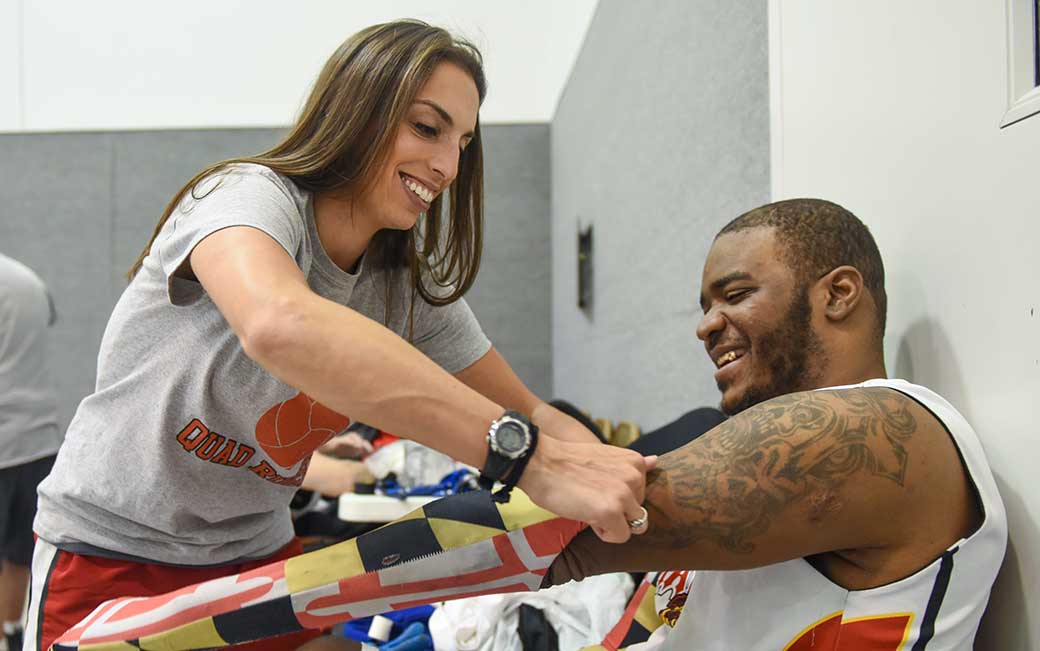Laura Karp ’15 doesn’t mind a little “Mayhem”
CHP alumna turns faculty member's invitation into a personal passion
By Megan Bradshaw on July 1, 2016. Photos by Lauren Castellana.

A young woman dressed in workout clothes steps out of a car at Honeygo Regional Park in Perry Hall, Maryland. Any of the other park goers may think she’s there to jog the trails that crisscross the land, through baseball and lacrosse fields.
Instead she heads to the park's lone building to get ready for wheelchair rugby practice.
Laura Karp ’15 graduated from Towson University's College of Health Professions with a master's degree in occupational therapy. During one of her classes with adjunct faculty member Lori Patria, Karp heard Patria invite students to quadriplegic rugby practice with the Maryland Mayhem. Patria, director of rehabilitational therapy services at the University of Maryland Rehabilitation & Orthopaedic Institute, helps manage the team.
Read a Baltimore Sun feature article on the Maryland Mayhem
Karp was hooked from her very first practice.
“I had worked a lot with kids and young adults with special needs along with development delays, but I had never worked with wheelchair sports,” she said. “It was a really eye-opening experience to understand physical disability because it is different from cognitive disability. It took a few weeks to figure out the different players, like who needs what and which require more assistance. Figuring that out was the biggest thing."
Karp quickly took on a larger role with the team.
“As a volunteer, I help get the players ready for practice and tournaments, set-up and organize rugby equipment, and assist with water breaks and basic first aid,” she continued. “My role is to get to know the team and their preferences [on levels of help required], so we can get them pushing (i.e. on the ground and playing rugby) as soon as possible once they get to practice.”
Patria remembers Karp’s early interest in the team and the sport.
“She was very passionate from the beginning,” Patria said. “Some students will participate in classes, and they won’t dive as deep. It was really the application [of the principles she’d learned] that made her want to come out to rugby. Right away, it was beyond the textbook for her.”
Patria believes it’s Karp’s authentic commitment to the players that cemented a quick bond with the team.
“Her genuineness and her real interest in them [made her fit in right away],” said Patria. “It wasn’t about volunteer hours for her. We’d have practice and some guys would want to meet up on the weekends to push at Lake Montebello, and she was there because she knew they would need help getting in and out of chairs. She reached them at a personal level.”
Team member Randy Johnson (pictured above) agrees.
“We value all of our volunteers, but Laura is great,” he said. “She’s the first to arrive and the last to leave, and she’s always willing to help. She’ll meet up with us outside of practice. I think the reason she’s fit in so well is just because of the person she is—friendly, welcoming and fun.”
While a still student at TU, Karp learned a lot she can use in her post-graduation life.
“Volunteering with Maryland Mayhem has taught me so much about spinal cord injury, wheelchairs, adapted sports, and living with disability–way more than I could have ever read in a textbook,” she said. “A lot of these guys have lost a lot–beyond function in their arms and legs–and the way that they see obstacles as challenges to overcome and are able to problem-solve to achieve their goals is incredible. Witnessing how hard they work to complete a task that we take for granted, like opening a door or changing a shirt, has changed how I view accessibility and the importance of physical rehabilitation.”
Patria has continued to encourage her students to volunteer with the team.
“In class, we talk about things that individuals who’ve had traumatic injury are going to need to learn to do different ways,” she said. “And we do need to focus on their strengths and limitations, but, in textbook format, it sounds very clinical, more negative and limiting.
“Then [a student] comes to practice and [they’re] like ‘oh, wow!’ Someone who has very limited use of their arms and no ability to move their legs can be very independent. Then [thery’re] not just studying muscles and enervation. [They’re] thinking, ‘oh, what can Randy do? What can Ryan do?’ When you see the joking and the bond they have despite really adverse circumstances, they can really overcome that and have more determination than you and I do.”
The bond the team members have with Karp has led them to TU on more than one occasion. The athletes surprised her at the M.S. OT graduation party.
“I hadn't seen the guys in what felt like months,” she remembered. “Walking into that room and seeing a circle of Maryland Mayhem players and volunteers was the most shocked and excited I've ever been in my life!”